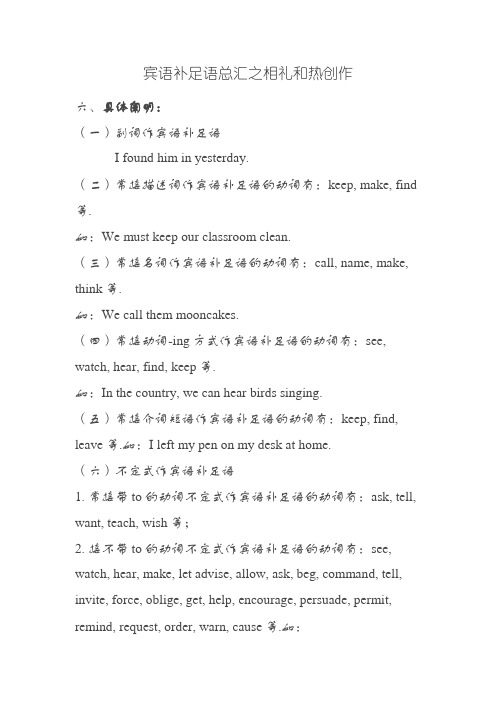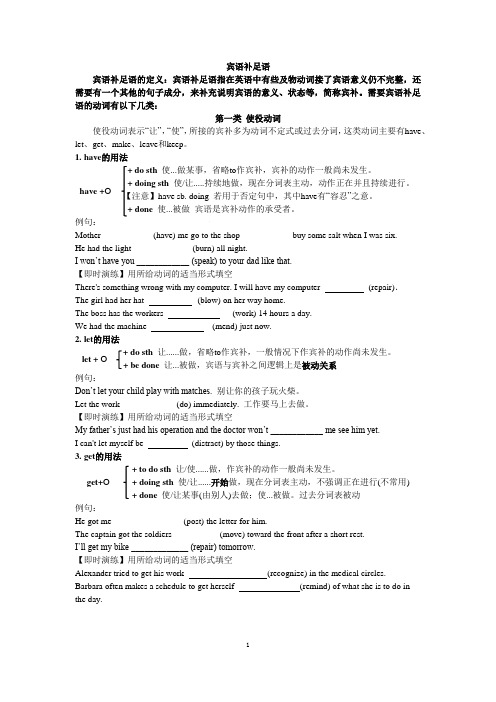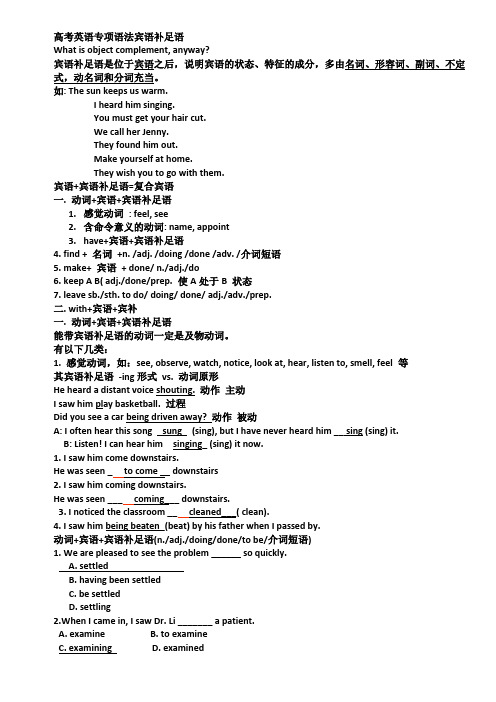高中英语宾语补足语总汇
高一英语宾语补足语

过去分词充当宾语补足语
• 1.过去分词作宾语补足语,表示其动作 已经完成 或结束 。能用宾语补足语的过去分词一般都是及 物动词,表示_被动意义或已完成的__意义,有时 候两者兼而有之。作宾语补足语的过去分词与宾 语有逻辑上的动宾关系,即宾语是过去分词动作 的对象。
• After waking up, I found everyone gone. • The speaker raised her voice to make herself
短语) • 4. We saw her entering the room. (现在分词或其
短语)
• 5.We must get the work finished by 10 o’clock. ( 过去分词)
• 6.We take English as a useful tool for research work. (用as引出)
;/ 阿里云代金券 腾讯云服务器 特价云服务器 阿里云服务器报价 元吉优惠券网 ;
object complement 宾语补足语
什么是宾语补足语?
• 英语中有些及物动词,除有一个直接宾语 以外,还要有一个宾语补足语(对宾语进行 补充或说明),才能使句子的意义完整。 这类常用的及物动词有: make , consider, cause ,see , find , call ,get ,have, let ect.
宾语补足语的9种表示法
• 1. His father named him Doming. (名词) • 2. They painted their house white. (形容词) • 3. You mustn’t force him to lend his money to
宾语补足语总汇

宾语补足语总汇之相礼和热创作六、具体阐明:(一)副词作宾语补足语I found him in yesterday.(二)常接描述词作宾语补足语的动词有:keep, make, find 等.如:We must keep our classroom clean.(三)常接名词作宾语补足语的动词有:call, name, make, think等.如:We call them mooncakes.(四)常接动词-ing方式作宾语补足语的动词有:see, watch, hear, find, keep等.如:In the country, we can hear birds singing.(五)常接介词短语作宾语补足语的动词有:keep, find, leave等.如:I left my pen on my desk at home.(六)不定式作宾语补足语1. 常接带to的动词不定式作宾语补足语的动词有:ask, tell, want, teach, wish等;2. 接不带to的动词不定式作宾语补足语的动词有:see, watch, hear, make, let advise, allow, ask, beg, command, tell, invite, force, oblige, get, help, encourage, persuade, permit, remind, request, order, warn, cause等.如:I often see him play football.She often asks me to help her.We don't allow such things to happen again.Most of the parents agree to forbid their children to smoke. She asked me to answer the phone in her absence.Please remind me to leave her this note.She requested him to go with her.3. 用不定式作宾语补足语的几种阐明:①help后面作宾语补足语的动词不定式可以带to也可以不带to.如:I often help my mother(to) do some housework.②在使役动词后作宾语补足语,不定式不带to.有些动词跟不定式作宾语补足语时省往了to,这些动词有:一感二听三让四观看.一感:feel二听:hear, listen to三让:let, have, make四观看:observe, see, watch, look at这类动词有:make, let, have等.转为自动语态时,其后通常都用带to的不定式 (have没有自动语态).What would you have me do?你要我做什么?She made him give up smoking.她让他戒了烟.Let him do whatever he wishes to do.他想干什么就让他干吧.Though he had often made his little sister cry, today he was made to cry by his littlesister.虽然经常是他弄哭小妹妹,但今天他却被小妹妹弄哭了3. 掌握“使役动词 have + 宾语+过往分词”的几种含义在“ have +宾语+过往分词”结构中,过往分词作宾语补足语, have 也可用 get .这一结构具有以下几种含义:①意为“主语请别人做某事”.例如:He wants to have his eyes examined tomorrow.他今天想往检查眼睛.(“检查”的动作由医生来进行)②意为“主语遭遇、蒙受某一不愉快、不测的事变”.例如:Be careful, or you'll have your hands hurt.当心,否则会弄伤手的.③意为“使完成某事”,事变既可以是别人做完,也可以由主语介入完成.例如:He had the walls painted this morning.他今早把墙漆了. (主语本人可能介入)④动词不定式也可作一些短语动词的宾语补足语.I'm waiting for James to arrive.我正等着詹姆斯的到来. He's arranged for a car to pick them up at the station.他已安插了一辆汽车往车站接他们.The UN has called on both sides to observe the cease fire.联合国号召交战单方服从开火协议.(七)分词作宾语补足语用如今分词作宾补,阐明宾语是动作的发出者,构成逻辑上的主谓关系;用过往分词作宾补,暗示宾语是动作的承受者,构成逻辑上的动宾关系.1. 跟分词作宾补的动词有:catch, have get, keep, hear, find, feel, leave, make, want, start, notice, observe, watch, set等.例如:There was so much noise t hat the speaker couldn’t make himself heard.由于非常吵闹,讲话人没法让人听到他的声响.When he awoke, he found himself being looked after by an old woman.他醒来的时分发现一位老大娘正在照顾他.2. 几种用过往分词作宾语补足语的状况阐明:①暗示“意欲;命令”的动词,如 like, want, wish, order 等,可用过往分词作宾语补足语.例如:The father wants his daughter taught the piano.这位父亲想让女儿学钢琴.②感官动词 see, hear, notice, observe, watch, feel, find 等后,可用过往分词作宾语补足语.例如:I saw an old man knocked down by a car just now.刚才我看到一位老人被车撞倒了.③使役动词 have, get, make, leave, keep等后可用过往分词作宾语补足语.例如:Have you got your films developed? 你拿胶卷往冲洗了没有?④“ with +宾语+过往分词”结构中,过往分词用作介词with 的宾语补足语.这一结构通常在句中作工夫、方式、条件、缘故原由等状语.例如:The murderer was brought in, with his hands tied behind his back.凶手被带进来了,他的双手被绑在面前.(表方式)With water heated, we can see the steam.水一被加热,我们就会看到水蒸气.(表条件)With the matter settled, we all went home.事变得到处理,我们都回家了.(表缘故原由)V.+宾语+宾补高考全解析“动词+宾语+宾补”的试题是高考试题中常考的学问点,这里呢,我就高考常考的能跟接“宾语+宾补”复合结构的动词进行偏重讲解,以帮忙大家掌握这一学问点:一、“make+宾语+宾补”的用法“make+宾语+宾补”这一结构中,宾语补足语可以由名词、描述词、过往分词、不定式等来充当,例如:(1)A good friend is someone who makes you happy.(描述词作宾补)(2)They made me repeat the story.(省to的动词不定式)(3)He raised his voice to make himself heard.(过往分词作宾补) 注:“make+宾语+宾补”结构中不必如今分词充当宾补.(4)We made him monitor of our class.(名词作宾补)注:职务名词充当宾补时其后面不要加冠词. 【高考试题链接】1. He is very popular among his students as he always tries to make them _____ in his lectures.(07江苏卷)A.interested B.interesting C.interest D.to interest2. My parents have always made me _____ about myself, even when I was twelve. A.feeling well B.feeling good C.feel well D.feel good答案:1.A 2.D二、“with+宾语+宾补”的用法“with+宾语+宾补”是高考试题中考查非常频繁的结构,“with+宾语+宾补”结构中的宾补次要有描述词、如今分词、过往分词、动词不定式等,在考题中常要求选择宾补的方式,在选择时宾补空间该运用什么方式,次要限决于宾语与宾补的关系,自动关系用如今分词,自动关系则用过往分词,此外,不定式作宾补要暗示含义为将来的意味,例如:(1)With so many people communicating in English every day, it will become more and more important to have a good knowledge of English.(宾语so many people与communicate是自动关系,因而用如今分词作宾补)(2)With everything he needed to buy, he went into the store.(不定式作宾补暗示将来的含义)(3)With everything he needed bought, he left the store.(过往分词作宾补表自动表完成)(4)With my key lost, I couldn’t enter my room.(过往分词作宾补)(5)With nothing to do, I went out for a walk.(不定式作宾补)(6)I went out with the window open.(描述词作宾补) 另外,“with+宾语+宾补”结构中还可由介词短语、副词短语来充当宾补,如:(1) She said good-bye with tears in her eyes.(2) He left the room with the light still on. 【高考试题链接】1.—Come on, please give me some ideas about the project. —Sorry. With so much work ______ my mind, I almost break down.A.filled B.filling C.to fill D.being filled2. John received an invitation to dinner, and with his work______ he gladly accepted it.A.finished B.finishing C.having finished D.was finished3. I couldn’t do my homework with all the noise______.(05北京)A.going on B.goes on C.went on D.to go on 答案:1. B 2. A 3. A三、“have+宾语+宾补”的用法在“have+宾语+宾补”这一结构用法中,充当宾补的经常运用的有do,doing, done 和adj,例如:(1) I’ll have my hair cut this afternoon.我今天下午要理发.(2) I won’t have you saying to your mother that way.(3) He realized that she did not wish to have her go with him.(4) I expect Amy will have the tea ready directly. 留意:have sth done的含义为“请别人来做某事或遭遇到某到状况”,例如: (1)I had the door painted last week.(2)He had his pocket picked.(3)She had her watch stolen. 【高考试题链接】1. Jenny hopes that Mr. Smith will suggest a good way to have her written English _____ in a short period.A.improved B.improving C.to improve D.improve2.—Did Peter fix the computer himself? —He _____, because he doesn’t know much about computers.(07安徽卷)A.has it fixed B.had fixed it C.had it fixed D.fixed it 3.You should understand the traffic rule by now. You’ve had it _____ often enough.(05天津) A.explaining B.to explain C.explain D.explained答案:1. A 2. C 3. D四、“find+宾语+宾补”的用法“find+宾语+宾补”这一结构中的宾语补足语可以由如今分词、过往分词、名词、描述词、副词、介词短语以及不定式to be等来充当.分别举例如下:(1)You will find it a very difficult book.(2)The youth found it a hard problem to think about.(3)When he came to himself, he found himself surrounded by a group of boys. (4)I hope to find you in better spirits when we meet again.(5)I find the Chinese people to be happy and cheerful.留意:find+宾语+宾补这一结构中通常不运用动词原形来充当宾语补足语,即没有“find+宾语+动词原形”这样的结构. 【高考试题链接】A cook will be immediately fired if he is found ____ in the kitchen.(03天下卷) A.smoke B.smoking C.to smoke D.smoked 答案:B. 五、“leave+宾语+宾补”的用法Leave+宾语+宾语补足语,其中宾语补足这一成分可以由过往分词、如今分词、描述词、介词的复合结构等来充当,分述如下:1.由过往分词来充当宾语补足语:leave sth/sb done,经常运用来暗示宾语所处的形态或暗示动作曾经完成.(1)Please excuse me if I have left any of your questions unanswered.(2)He got up slowly leaving the lunch unfinished.(3)Did you leave the doors and windows firmly fastened? △可用于自动语态: Hi!My patient can’t be left unattached.2.由如今分词来充当宾语补足语:leave sb/sth doing,经常运用来暗示使某人或某物不停做某事: (1)Don’t leave her waiting outside in the rain.(2)They went off together and left me sitting there. (3)Weleft him painting the gate. △可用于自动语态: Now thetemple has only its walls left standing. The papers were left lying around.3.由描述词来充当宾语补足语: (1)You’d better leave the drawing-room door open. (2)His illness has left him weak. △可用于自动语态: The window was left open.4.由介词的复合结构充当宾语补足语: (1)Leave him in peace! (2)His illness left him with a weak heart. (3)You’ve left her name off the list. △可用于自动语态: I was left without a ray of hope. 【高考试题链接】A good story does not necessarily have to have a happy ending, but the reader must not be left______.(06天津卷) A.unsatisfied B.unsatisfying C.to be unsatisfying D.being unsatisfied 答案:A六、“hear+宾语+宾补”的用法“hear+宾语+宾补”这一结构中的宾补常可以由如今分词、不带to的不定式、过往分词等来充当,如: Through the wall he could hear Harris cleaning his teeth. She could hear the rain pattering against the windows. Have you ever heard a pop song sung in Japanese? I won’t hear anything said against him behind his back. 【高考试题链接】 After a knock at the door, the child heard his mother’s voice _____ him.(07上海卷) A.calling B.called C.being called D.to call 答案:A.。
高中英语宾语补足语总汇

宾语补足语总汇(一)副词作宾语补足语I found him in yesterday.(二)常接形容词作宾语补足语的动词有:keep, make, find等。
如:We must keep our classroom clean.(三)常接名词作宾语补足语的动词有:call, name, make, think等。
如:We call them mooncakes.(四)常接动词-ing形式作宾语补足语的动词有:see, watch, hear, find, keep等。
如:In the country, we can hear birds singing.(五)常接介词短语作宾语补足语的动词有:keep, find, leave等。
如:I left my pen on my desk at home.(六)不定式作宾语补足语1. 常接带to的动词不定式作宾语补足语的动词有:ask, tell, want, teach, wish等;2. 接不带to的动词不定式作宾语补足语的动词有:see, watch, hear, make, let advise, allow, ask, beg, command, tell, invite, force, oblige, get, help, encourage, persuade, permit, remind, request, order, warn, cause等。
如:I often see him play football.She often asks me to help her.We don't allow such things to happen again.Most of the parents agree to forbid their children to smoke.She asked me to answer the phone in her absence.Please remind me to leave her this note.She requested him to go with her.3. 用不定式作宾语补足语的几种说明:①help后面作宾语补足语的动词不定式可以带to也可以不带to。
高考英语复习宾语补足语+学案

宾语补足语宾语补足语的定义:宾语补足语指在英语中有些及物动词接了宾语意义仍不完整,还需要有一个其他的句子成分,来补充说明宾语的意义、状态等,简称宾补。
需要宾语补足语的动词有以下几类:第一类 使役动词使役动词表示“让”,“使”,所接的宾补多为动词不定式或过去分词,这类动词主要有have 、let 、get 、make 、leave 和keep 。
1. have 的用法 使...做某事,省略to 作宾补,宾补的动作一般尚未发生。
使/让.....持续地做,现在分词表主动,动作正在并且持续进行。
【注意】have sb. doing 若用于否定句中,其中have 有“容忍”之意。
使...被做 宾语是宾补动作的承受者。
例句:Mother ___________ (have) me go to the shop ___________ buy some salt when I was six. He had the light _____________ (burn) all night.I won’t have you ____________ (speak) to your dad like that.【即时演练】用所给动词的适当形式填空There's something wrong with my computer. I will have my computer (repair). The girl had her hat (blow) on her way home.The boss has the workers (work) 14 hours a day.We had the machine (mend) just now.2. let 的用法让......做,省略to 作宾补,一般情况下作宾补的动作尚未发生。
让...被做,宾语与宾补之间逻辑上是被动关系例句:Don’t let your child play with matches. 别让你的孩子玩火柴。
宾语补足语总汇

宾语补足语总汇Company Document number:WTUT-WT88Y-W8BBGB-BWYTT-19998宾语补足语总汇六、具体说明:(一)副词作宾语补足语I found him in yesterday.(二)常接形容词作宾语补足语的动词有:keep, make, find等。
如:We must keep our classroom clean.(三)常接名词作宾语补足语的动词有:call, name, make, think等。
如:We call them mooncakes.(四)常接动词-ing形式作宾语补足语的动词有:see, watch, hear, find, keep 等。
如:In the country, we can hear birds singing.(五)常接介词短语作宾语补足语的动词有:keep, find, leave等。
如:I left my pen on my desk at home.(六)不定式作宾语补足语1. 常接带to的动词不定式作宾语补足语的动词有:ask, tell, want, teach, wish 等;2. 接不带to的动词不定式作宾语补足语的动词有:see, watch, hear, make, let advise, allow, ask, beg, command, tell, invite, force, oblige, get, help, encourage, persuade, permit, remind, request, order, warn, cause等。
如:I often see him play football.She often asks me to help her.We don't allow such things to happen again.Most of the parents agree to forbid their children to smoke.She asked me to answer the phone in her absence.Please remind me to leave her this note.She requested him to go with her.3. 用不定式作宾语补足语的几种说明:①help后面作宾语补足语的动词不定式可以带to也可以不带to。
高中英语语法 宾语补足语(共40张PPT)PPT文档共42页

55、 为 中 华 之 崛起而 读书。 ——周 恩来
45、法律的制定是为了保证每一个人 自由发 挥自己 的才能 ,而不 是为了 束缚 之 事 常成 于困约 ,而败 于奢靡 。——陆 游 52、 生 命 不 等 于是呼 吸,生 命是活 动。——卢 梭
高中英语语法 宾语补足语 (共40张PPT)
41、实际上,我们想要的不是针对犯 罪的法 律,而 是针对 疯狂的 法律。 ——马 克·吐温 42、法律的力量应当跟随着公民,就 像影子 跟随着 身体一 样。— —贝卡 利亚 43、法律和制度必须跟上人类思想进 步。— —杰弗 逊 44、人类受制于法律,法律受制于情 理。— —托·富 勒
高三英语宾语补足语

• What he said made me angry.
• We consider the answer correct.
• Everyone calls him Tom.
带有宾语补足语的一般句型为:
• 某些及物动词(如make等)+直接宾语 (名词或代词)+宾语补足语
宾语补足语的9种表示法
• 1. His father named him Doming. (名词) • 2. They painted their house white. (形容词) • 3. You mustn’t force him to lend his money to
you. (不定式) • Nobody noticed him enter the room. (不定式
object complement 宾语补足语
• 英语中有些及物动词,除有一个直接宾语 以外,还要有一个宾语补足语(对宾语进行 补充或说明),才能使句子的意义完整。 这类常用的及物动词有: make , consider, cause ,see , find , call ,get ,have, let ect.
过去分词充当宾语补足语
• 1.过去分词作宾语补足语,表示其动作 已经完成 或结束 。能用宾语补足语的过去分词一般都是及 物动词,表示_被动意义或已完成的__意义,有时 候两者兼而有之。作宾语补足语的过去分词与宾 语有逻辑上的动宾关系,即宾语是过去分词动作 的对象。
• After waking up, I found everyone gone. • The speaker raised her voice to make herself
heard. • They found their new bikes stolen.
高考英语专项语法宾语补足语

高考英语专项语法宾语补足语What is object complement, anyway?宾语补足语是位于宾语之后,说明宾语的状态、特征的成分,多由名词、形容词、副词、不定式,动名词和分词充当。
如: The sun keeps us warm.I heard him singing.You must get your hair cut.We call her Jenny.They found him out.Make yourself at home.They wish you to go with them.宾语+宾语补足语=复合宾语一. 动词+宾语+宾语补足语1.感觉动词: feel, see2.含命令意义的动词: name, appoint3.have+宾语+宾语补足语4. find + 名词+n. /adj. /doing /done /adv. /介词短语5. make+ 宾语+ done/ n./adj./do6. keep A B( adj./done/prep. 使A处于B 状态7. leave sb./sth. to do/ doing/ done/ adj./adv./prep.二. with+宾语+宾补一. 动词+宾语+宾语补足语能带宾语补足语的动词一定是及物动词。
有以下几类:1. 感觉动词,如:see, observe, watch, notice, look at, hear, listen to, smell, feel 等其宾语补足语-ing形式vs. 动词原形He heard a distant voice shouting. 动作主动I saw him play basketball. 过程Did you see a car being driven away? 动作被动A: I often hear this song sung (sing), but I have never heard him __ sing (sing) it.B: Listen! I can hear him singing_ (sing) it now.1. I saw him come downstairs.He was seen _to come __ downstairs2. I saw him coming downstairs.He was seen ___coming___ downstairs.3. I noticed the classroom __cleaned___( clean).4. I saw him being beaten_(beat) by his father when I passed by.动词+宾语+宾语补足语(n./adj./doing/done/to be/介词短语)1. We are pleased to see the problem ______ so quickly.A. settledB. having been settledC. be settledD. settling2.When I came in, I saw Dr. Li _______ a patient.A. examineB. to examineC. examiningD. examined3. The manager discussed the plan that they would like to see _______the next) year.(NMET2000)A. carry outB. carrying outC. carried out D.to carry out2. 含命名意义的动词,如:call, name, appoint, elect, make, consider等。
- 1、下载文档前请自行甄别文档内容的完整性,平台不提供额外的编辑、内容补充、找答案等附加服务。
- 2、"仅部分预览"的文档,不可在线预览部分如存在完整性等问题,可反馈申请退款(可完整预览的文档不适用该条件!)。
- 3、如文档侵犯您的权益,请联系客服反馈,我们会尽快为您处理(人工客服工作时间:9:00-18:30)。
宾语补足语总汇
(一)副词作宾语补足语
I found him in yesterday.
(二)常接形容词作宾语补足语的动词有:keep, make, find等。
如:We must keep our classroom clean.
(三)常接名词作宾语补足语的动词有:call, name, make, think等。
如:We call them mooncakes.
(四)常接动词-ing形式作宾语补足语的动词有:see, watch, hear, find, keep等。
如:In the country, we can hear birds singing.
(五)常接介词短语作宾语补足语的动词有:keep, find, leave等。
如:I left my pen on my desk at home.
(六)不定式作宾语补足语
1. 常接带to的动词不定式作宾语补足语的动词有:ask, tell, want, teach, wish等;
2. 接不带to的动词不定式作宾语补足语的动词有:see, watch, hear, make, let advise, allow, ask, beg, command, tell, invite, force, oblige, get, help, encourage, persuade, permit, remind, request, order, warn, cause等。
如:
I often see him play football.
She often asks me to help her.
We don't allow such things to happen again.
Most of the parents agree to forbid their children to smoke.
She asked me to answer the phone in her absence.
Please remind me to leave her this note.
She requested him to go with her.
3. 用不定式作宾语补足语的几种说明:
①help后面作宾语补足语的动词不定式可以带to也可以不带to。
如:I often help my mother(to) do some housework.
②在使役动词后作宾语补足语,不定式不带to。
有些动词跟不定式作宾语补足语时省去了to,这些动词有:一感二听三让四观看。
一感:feel
二听:hear, listen to
三让:let, have, make
四观看:observe, see, watch, look at
这类动词有:make, let, have等。
转为被动语态时,其后通常都用带to的不定式(have没有被动语态)。
What would you have me do?
你要我做什么?She made him give up smoking.
她让他戒了烟。
Let him do whatever he wishes to do.
他想干什么就让他干吧。
Though he had often made his little sister cry, today he was made to cry by his little sister.虽然经常是他弄哭小妹妹,但今天他却被小妹妹弄哭了
3. 掌握“使役动词have + 宾语+过去分词”的几种含义
在“ have +宾语+过去分词”结构中,过去分词作宾语补足语,have 也可用get 。
这一结构具有以下几种含义:
①意为“主语请别人做某事”。
例如:
He wants to have his eyes examined tomorrow.
他明天想去检查眼睛。
(“检查”的动作由医生来进行)
②意为“主语遭遇、遭受某一不愉快、不测的事情”。
例如:
Be careful, or you'll have your hands hurt. 当心,否则会弄伤手的。
③意为“使完成某事”,事情既可以是别人做完,也可以由主语参与完成。
例如:He had the walls painted this morning.
他今早把墙漆了。
(主语自己可能参与)
④动词不定式也可作一些短语动词的宾语补足语。
I'm waiting for James to arrive.我正等着詹姆斯的到来。
He's arranged for a car to pick them up at the station.
他已安排了一辆汽车去车站接他们。
The UN has called on both sides to observe the cease fire.
联合国号召交战双方遵守停火协定。
(七)分词作宾语补足语
用现在分词作宾补,说明宾语是动作的发出者,形成逻辑上的主谓关系;用过去分词作宾补,表示宾语是动作的承受者,构成逻辑上的动宾关系。
1. 跟分词作宾补的动词有:catch, have get, keep, hear, find, feel, leave, make, want, start, notice, observe, watch, set等。
例如:
There was so much noise that the spe aker couldn’t make himself heard.
由于十分吵闹,讲话人没法让人听到他的声音。
When he awoke, he found himself being looked after by an old woman.
他醒来的时候发现一位老大娘正在照顾他。
